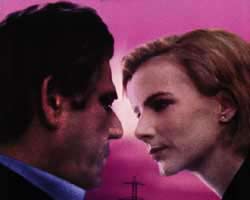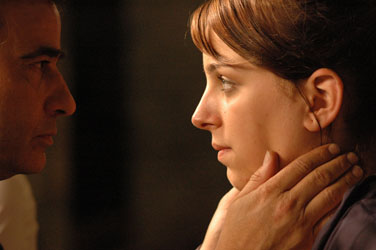I was expecting the screening to be a very sterile PR event like the one I went to for Braveheart in New York a couple of months ago, but it was a lovely event, with plenty of excited kids and appearances from Cybermen, Ood and a Judoon.
My own excitement levels were raised before I even got into the Television Centre; I came through the revolving door with Steven Moffat, who was hoping that he wouldn't have to say "Don't you know who I am?" to the army of clipboard nazis gathered in reception.
There was a Q&A after the screening, with RTD, John Simm and Bernard Cribbins on stage. However, most of the questions related to what we'd just seen, so I can't relate the answers without giving too much away. Bernard Cribbins was his usual brilliant self - he's still sharp as a tack - and it's great to think that a whole new generation is enjoying him.
Afterwards, everyone piled back into the reception room for mince pies, mulled wine and encounters with the monsters. Unfortunately the snow had started to tumble down by that stage, so I couldn't really hang around, but everyone seemed to be having a marvellous time.
Anyway, here's the preview. And happy holiday to you all! I'll be back next year.
 OK, so there's a fair chance you don't need convincing to watch Doctor Who this Christmas Day. In fact, it might well have been the first thing you marked up as you sat down with your double-sized Radio Times, highlighter pen and mug of Assam.
OK, so there's a fair chance you don't need convincing to watch Doctor Who this Christmas Day. In fact, it might well have been the first thing you marked up as you sat down with your double-sized Radio Times, highlighter pen and mug of Assam. However, The End of Time – David Tennant's final two-part adventure as the Doctor – is clearly going to be a bigger deal than the average Chrimbo special. It starts off with an epic feel, narrated ominously by Timothy Dalton, and before long the Doctor is summoned to meet his dangly old muckers the Ood, who warn of a darkness falling across the universe.
Meanwhile, back on Earth, everyone is having nightmares that no-one can remember the next day – no-one, that is, apart from poor old Wilf Mott (Bernard Cribbins), the grandfather of the Doctor's former companion Donna Noble (Catherine Tate).
It'd be criminal to give much more away, but it's no secret that John Simm comes back as the Doctor's old adversary, the Master. There's also a creepy billionaire (David Harewood) who's tinkering about with a bit of alien technology that fell into his hands after Torchwood went boom. So that's obviously going to turn out well...
The episode is spectacular: it's very cinematic and looked at home on the big screen at the preview. However, it does hit a few bum notes early on: the way the Master makes his comeback isn't totally convincing, and there are a couple of sequences that would look more at home in Heroes.
However, Cribbins is brilliant as the time-worn and haunted Wilf, who seems – reluctantly – to be at the heart of the gathering storm. And one simple scene of Wilf and the Doctor talking in a café packs the biggest emotional wallop the show's seen since the Doctor had to say ta-ta to Rose.
John Simm has great fun as the Master, who's more feral and insane than ever. There are a couple of scenes that will have you holding your stomach and groaning if you're still full after your Christmas dinner.
His plan for revenge on the Doctor is a cracker, and as it takes effect at the climax of the episode, it sets up what should be a massive conclusion on New Year's Day.
Of course, that may not be the full story; Russell T Davies is notorious for cutting out big surprises from press screenings and we didn't see a trailer for the grand finale, so – literally – anything could happen. I'm excited!



















